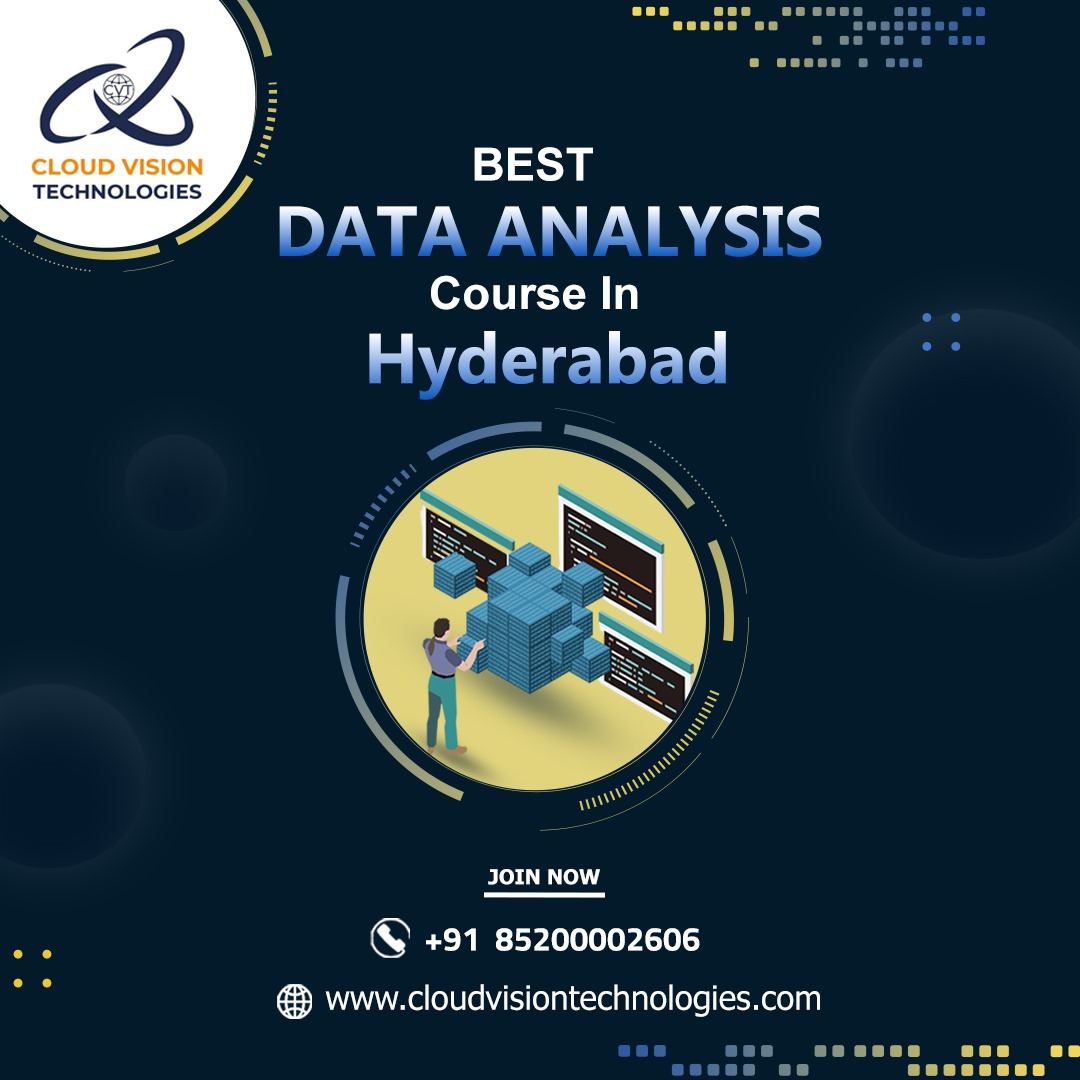
Data Analytics Course in Hyderabad
Introduction to Data Analytics
Data Analytics Course in Hyderabad, In today’s digital age, data is generated at an unprecedented rate from smartphones, websites, sensors, transactions, and social media. But raw data on its own holds little value; the true power lies in how we interpret and use that data to make informed decisions. This is where data analytics comes into play. Cloud Vision Technologies.
Data analytics is the science of examining, cleaning, transforming, and modeling data to discover meaningful patterns, draw conclusions, and support decision-making. From helping businesses understand customer behavior to predicting future market trends, data analytics plays a crucial role in nearly every industry today. Data Analytics Course in Hyderabad.
As organizations become increasingly data-driven, the demand for professionals who can understand and extract value from data continues to grow. Whether you’re a student exploring career paths or a business looking to enhance your operations, understanding data analytics is essential in today’s information-rich world. Data Analytics Course in Hyderabad.

What is Data Analytics?
Data Analytics is the process of examining raw data to uncover useful insights, draw conclusions, and support decision-making. It involves collecting, organizing, and analyzing large volumes of data to identify patterns, trends, and relationships that may not be immediately obvious. In today’s data-driven world, businesses across all industries rely on data analytics to make informed decisions, improve performance, and gain a competitive edge. Data Analytics Course in Hyderabad.
Importance of Data Analytics
In a world driven by information, data analytics has emerged as a critical tool for organizations of all sizes. It helps them understand what is happening within their operations, uncover patterns, and make decisions rooted in facts rather than assumptions. With the right data analytics strategy, businesses can gain a competitive edge and thrive in a fast-changing marketplace. Data Analytics Course in Hyderabad.
One of the key benefits of data analytics is its ability to improve business efficiency. By analyzing operational data, companies can identify bottlenecks, optimize workflows, and streamline processes. For example, manufacturers can track production data to reduce downtime, while retailers can analyze supply chain data to minimize delays and inventory shortages. Data Analytics Course in Hyderabad.
Another major advantage is the ability to predict future trends. Predictive analytics helps organizations forecast customer behavior, market shifts, and potential risks. This enables them to proactively plan strategies, adjust offerings, and stay ahead of the curve. Whether it’s forecasting sales or anticipating equipment failures, the insights gained can lead to more accurate and timely decision-making. Data Analytics Course in Hyderabad.
Understanding customer behavior is also a core benefit of data analytics. By analyzing purchase patterns, browsing history, and customer feedback, businesses can gain a deep understanding of what their customers want. This insight allows for the development of personalized experiences, improved products, and stronger customer relationships.
Data analytics also plays a crucial role in optimizing marketing campaigns. Marketers can track campaign performance in real time, identify what’s working, and adjust their strategies accordingly. From targeting the right audience to allocating budgets effectively, data-driven marketing ensures better return on investment (ROI).
Types of Data Analytics
Data analytics can be categorized into four main types, each offering different insights and serving unique purposes in decision-making. Understanding these types is essential for selecting the right analytical approach for your business goals or research objectives.
Descriptive Analytics
Descriptive analytics focuses on what has already happened. It involves collecting and analyzing historical data to identify patterns, trends, and summaries. This type of analytics is most commonly used in business dashboards, monthly reports, and performance reviews. For instance, a sales report showing revenue growth over the last quarter is an example of descriptive analytics. It helps organizations get a clear view of past performance and provides a foundation for further analysis. Data Analytics Course in Hyderabad.
Diagnostic Analytics
While descriptive analytics tells you what happened, diagnostic analytics helps explain why it happened. It digs deeper into data by identifying causes, correlations, and relationships. This often involves techniques such as drill-down analysis, data mining, and correlation analysis. For example, if a retail store saw a drop in sales in a particular month, diagnostic analytics might explore factors like seasonality, competitor actions, or changes in customer behavior to understand the root cause. This insight is valuable for addressing problems and making informed improvements. Data Analytics Course in Hyderabad.
Predictive Analytics
Predictive analytics goes beyond the past and present to answer the question: “What is likely to happen in the future?” It uses statistical algorithms, machine learning models, and historical data to forecast outcomes. Common applications include predicting customer churn, sales trends, or equipment failures. Businesses use predictive analytics to plan ahead, allocate resources wisely, and make proactive decisions. While it’s not about certainty, predictive analytics significantly increases the accuracy of future expectations.
Prescriptive Analytics
Prescriptive analytics is the most advanced type and answers the question: “What should we do next?” It uses techniques like optimization algorithms, simulations, and decision modeling to recommend the best course of action based on available data. This type of analytics is especially useful in scenarios that involve multiple variables and complex decision-making, such as supply chain management or pricing strategies. By weighing different options and predicting their outcomes, prescriptive analytics helps businesses choose actions that maximize results or minimize risks.

The Data Analytics Process
The journey from raw data to meaningful insights involves a structured and thoughtful process. Whether you’re analyzing customer feedback or predicting sales trends, following these key steps ensures accuracy, relevance, and impact in your results.
Data Collection – Gathering the Right Information
The first step in the data analytics process is data collection. This involves sourcing data from a variety of channels such as company databases, websites, sensors, social media platforms, mobile apps, or spreadsheets. The goal is to gather relevant, high-quality data that aligns with the problem or objective at hand. The accuracy and completeness of the data at this stage heavily influence the success of the entire analytics process. For example, a retail business might collect transaction data, customer reviews, and web traffic data to analyze shopping behavior. Data Analytics Course in Hyderabad.
Data Cleaning – Preparing for Analysis
Once data is collected, it often needs to be cleaned before analysis can begin. Data cleaning involves removing errors, correcting inconsistencies, filling in missing values, and eliminating duplicates. This step is crucial because even small inaccuracies can skew results and lead to incorrect conclusions. Proper cleaning ensures that the data is structured, reliable, and ready for further exploration. It’s one of the most time-consuming steps but is absolutely essential for maintaining data integrity. Data Analytics Course in Hyderabad.
Data Exploration – Understanding the Dataset
After cleaning, the next step is data exploration, also known as exploratory data analysis (EDA). This involves summarizing the main characteristics of the dataset using visual tools like histograms, box plots, scatter plots, and summary statistics. The purpose is to uncover trends, patterns, anomalies, and relationships between variables. For example, a company analyzing customer data might discover that users from certain locations are more likely to make repeat purchases. This step provides a deeper understanding of the data and guides further analysis. Data Analytics Course in Hyderabad.
Data Analysis – Extracting Meaningful Insights
With a clear understanding of the data, analysts move to the data analysis phase. Here, statistical techniques, mathematical models, or machine learning algorithms are applied to extract actionable insights. Depending on the goals, this could involve calculating averages, performing regressions, segmenting data, or predicting future outcomes. For instance, a logistics company might analyze delivery times to optimize routes and reduce delays. The choice of technique depends on the type of data and the business problem being solved.
Interpretation and Reporting – Communicating the Results
The final step is interpreting the results and communicating them in a way that stakeholders can understand and act upon. This often involves creating visual reports, dashboards, or presentations that clearly show the findings and their implications. Tools like Power BI, Tableau, or Google Data Studio are commonly used to create interactive visualizations. The goal is not just to present numbers, but to tell a story backed by data that leads to smarter, data-informed decisions. Data Analytics Course in Hyderabad.
Tools and Technologies in Data Analytics
Data analytics involves working with large volumes of information, and to make this process efficient and insightful, professionals rely on a variety of tools and technologies. Each tool serves a specific purpose, from cleaning and analyzing data to creating visual reports. Here’s a closer look at some of the most commonly used tools in the field of data analytics:
Excel – The Foundation of Data Analysis
Microsoft Excel remains one of the most widely used tools for basic data analytics, especially for small datasets. It offers powerful features such as pivot tables, conditional formatting, data filtering, and built-in functions that make it easy to organize, analyze, and visualize data. Excel is often the first tool analysts learn and is still preferred for quick calculations, financial modeling, and ad-hoc reporting. Its familiarity and flexibility make it a go-to option for many business professionals. Data Analytics Course in Hyderabad.
Python and R – Powerhouses of Statistical Analysis
For more advanced data manipulation and statistical analysis, programming languages like Python and R are extensively used. Python, in particular, has gained immense popularity due to its readability and robust ecosystem of libraries such as Pandas, NumPy, Matplotlib, Seaborn, and Scikit-learn. R, on the other hand, is favored by statisticians for its powerful statistical computing and graphical capabilities. Both languages are capable of handling large datasets, automating tasks, and building complex models, making them indispensable in the data science and analytics world. Data Analytics Course in Hyderabad.
Power BI and Tableau – Data Visualization Experts
When it comes to turning raw data into insightful visuals, tools like Power BI and Tableau are industry leaders. These business intelligence platforms allow users to create interactive dashboards and visual reports without needing advanced coding skills. With drag-and-drop interfaces and strong integration capabilities, they help decision-makers see trends and KPIs at a glance. They are particularly useful for presenting findings to non-technical stakeholders and making data-driven decisions quickly. Data Analytics Course in Hyderabad.
SQL – The Language of Data
Structured Query Language (SQL) is essential for querying, updating, and managing data in relational databases. Whether it’s MySQL, PostgreSQL, or Microsoft SQL Server, knowledge of SQL allows analysts to efficiently retrieve specific data, filter records, join tables, and generate reports. It forms the backbone of many data workflows, especially in organizations that rely heavily on database management systems. Mastering SQL is crucial for anyone looking to become a proficient data analyst. Data Analytics Course in Hyderabad.
Apache Hadoop and Spark – Big Data Technologies
As the volume of data continues to grow, traditional tools may not be sufficient to process massive datasets. This is where Apache Hadoop and Apache Spark come into play. Hadoop allows for distributed storage and processing of big data across multiple machines, while Spark provides faster in-memory data processing and supports advanced analytics like machine learning and graph processing. These technologies are widely used in industries dealing with real-time data, large-scale analytics, and cloud-based data infrastructures. Data Analytics Course in Hyderabad.

Applications of Data Analytics
Data analytics has become an essential part of decision-making in almost every industry. By transforming raw data into actionable insights, it enables organizations to operate more efficiently, understand their markets, and deliver better value to customers. Here’s a closer look at how different sectors are leveraging data analytics:
Retail
In the retail industry, data analytics plays a vital role in understanding consumer behavior and improving customer experiences. By analyzing purchase history, browsing patterns, and feedback, businesses can identify buying trends and customer preferences. This insight helps retailers personalize marketing offers, manage inventory more effectively, and ensure the right products are available at the right time. Predictive analytics is also used to forecast demand and plan future stock levels, reducing waste and maximizing sales.
Healthcare
Healthcare organizations use data analytics to improve the quality and efficiency of patient care. Clinical data is analyzed to identify patterns in symptoms, treatment effectiveness, and patient outcomes. This information helps doctors make more accurate diagnoses and develop personalized treatment plans. Additionally, healthcare providers use data to optimize hospital operations, reduce readmission rates, and monitor the spread of diseases. Predictive analytics can also identify at-risk patients, allowing for early intervention and preventative care. Data Analytics Course in Hyderabad.
Finance
In the financial sector, data analytics is crucial for risk management and fraud detection. Banks and financial institutions analyze large volumes of transactions to detect unusual patterns that may indicate fraudulent activity. It is also used to assess credit risk, evaluate investment opportunities, and enhance customer service by offering tailored financial products. Moreover, real-time analytics helps in monitoring stock markets, managing portfolios, and making informed trading decisions. Data Analytics Course in Hyderabad.
Marketing
Marketers rely heavily on data analytics to run effective campaigns and reach the right audience. By analyzing customer data from social media, websites, and purchase histories, businesses can segment their target audiences and craft personalized marketing messages. Data also helps measure campaign performance through key metrics like click-through rates, conversions, and return on investment (ROI). This ensures that marketing budgets are spent wisely and strategies are continuously optimized for better results. Data Analytics Course in Hyderabad.
Manufacturing
In manufacturing, data analytics is used to streamline production processes, reduce costs, and maintain product quality. By analyzing machine performance, production schedules, and supply chain data, manufacturers can identify inefficiencies and prevent equipment failures before they happen. This leads to reduced downtime, improved safety, and more consistent product output. Predictive maintenance powered by data analytics also ensures that machines are serviced at the right time, avoiding costly breakdown. Data Analytics Course in Hyderabad.
Data Analytics Course in Hyderabad
In the age of digital transformation, data is one of the most powerful assets for any business. As companies increasingly rely on data to make informed decisions, the demand for skilled data analytics professionals is soaring. If you’re in Hyderabad and looking to start or advance your career in this exciting field, enrolling in a Data Analytics course can be your first step toward success. Data Analytics Course in Hyderabad.
Hyderabad has emerged as a major IT and tech hub in India, with countless startups, multinational companies, and tech giants setting up offices here. With this thriving ecosystem comes a growing demand for data professionals who can extract insights and drive value from complex datasets. Training in Hyderabad not only gives you access to top-rated institutes but also offers networking opportunities and proximity to potential employers. Data Analytics Course in Hyderabad.

Conclusion
Data analytics is transforming the way organizations operate and make decisions. It empowers businesses with the insights they need to stay competitive in today’s digital age. Whether you’re a student, a job seeker, or a business owner, understanding and leveraging data analytics can be a powerful step forward in your journey. Data Analytics Course in Hyderabad.
Data analytics is no longer just a buzzword, it’s a powerful tool that drives innovation, improves decision-making, and gives businesses a competitive edge. From uncovering hidden trends to predicting future outcomes, data analytics plays a crucial role in nearly every industry today. Whether you’re just beginning your journey or looking to upskill, learning data analytics opens up a world of career opportunities. With the growing demand for data professionals and the availability of quality training in cities like Hyderabad, there’s no better time to dive into the world of data. Data Analytics Course in Hyderabad.
Address: Cloud Vision Technologies
Location: Samhitha Enclave, 3rd floor, KPHB Phase 9, Kukatpally, Hyderabad, Telangana – 500072
Contact Number : +91 8520002606
Mail ID: info@cloudvisiontechnologies.com
Website: https://www.cloudvisiontechnologies.com





